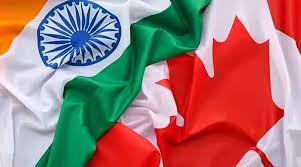Canada: There has been a sharp decrease in the number of Indian students applying for study permits in Canada. This comes following a diplomatic dispute between India and Canada over the murder of Khalistani terrorist, a top Canadian official told Reuters. As per official data, there has been an 86 per cent drop in study permits issued to Indians in the fourth quarter of 2023. Around 14,910 students were issued study permits in late last year which is a huge drop from the earlier 108,940 students.
This comes after Canadian Prime Minister Justin Trudeau said there was evidence connecting Indian agents to the murder of Khalistani terrorist Hardeep Singh Nijjar in British Columbia which led to a rise in diplomatic tensions between Canada and India. India rejected the allegation. Canadian authorities are yet to charge anyone for the killing.
Indians formed the largest group of international students in Canada in 2022 with more than 41 per cent or 225,835 of all permits going to them in that year. The number of study permits for Indian students, however, is unlikely to rebound soon, believes Immigration Minister Marc Miller. “Our relationship with India has really halved our ability to process a lot of applications from India,” Miller added.
“I can’t tell you about how the diplomatic relationship will evolve, particularly if police were to lay charges,” Miller further said, adding that there may not be any light at the end of the tunnel soon.
Canada pulled 41 diplomats, or two-thirds of its staff, out of India in October following orders from New Delhi. This situation led Indian students to look for other options to continue their studies besides Canada, a spokeswoman for the minister told the news agency.
Counselor for the High Commission of India in Ottawa, C Gurus Ubramanian said that several Indian students are now looking at other options besides Canada because of concerns regarding a “lack of residential and adequate teaching facilities” at some Canadian universities, the news agency reported.
International students bring about 22 billion Canadian dollars or 16.4 billion dollars annually and the reduction in the decrease in study permits is a huge blow to the institutions.
Canada is a popular destination among international students due to its easy-to-obtain work permits after completing courses there. The number of permits given to Indian students last year declined by 4 per cent overall, however, they remained the largest group.
The reduction in the overall number of international students entering the country also comes as a response to an ongoing housing shortage. “Right now we have a challenge with the sheer volume” of students coming in, Miller said. “It’s just gotten out of control and needs to be reduced significantly over a short period,” he added. The Canadian government also plans to put a possible cap on the number of international students getting study permits during the first half of this year. The government has already put plans to curb the number of off-campus work hours for international students. The food service and retail industries, however, fear this could lead to labor shortages.







